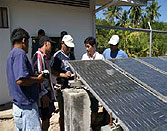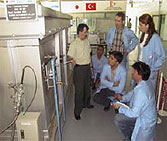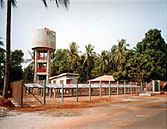Official Development Assistance (ODA)
|
|
| >>ODA Policy on Energy >>Good Practices on Energy |
Last Updated: November 19, 2007 |

Japan, aiming at improving energy accessibility and global warming countermeasures, actively supports the provision of electricity to rural areas, energy saving, and introduction of renewable energy in developing countries.
- The Framework Featured in ODA Charter & Mid-Term Policy (Extracts)
Japan's Official Development Assistance Charter (August, 2003)
I. Philosophy: Objectives, Policies, and Priorities
1. Objectives
As nations deepen their interdependence, Japan, which enjoys the benefits of international trade and is heavily dependent on the outside world for resources, energy and food, will proactively contribute to the stability and development of developing countries through its ODA. This correlates closely with assuring Japan's security and prosperity and promoting the welfare of its people. In particular, it is essential that Japan make efforts to enhance economic partnership and vitalize exchange with other Asian countries with which it has particularly close relations.
3. Priority Issues
(3) Addressing Global Issues
As for global issues such as global warming and other environmental problems, infectious diseases, population, food, energy, natural disasters, terrorism, drugs, and internationally organized crimes, further efforts must be given immediately and in a coordinated manner by the international community. Japan will address these issues through ODA and will play an active role in the creation of international norms.
4. Priority Regions
The Middle East is an important region for energy supply and for the peace and stability of the international community, but it has destabilizing factors including the situation of Middle East peace process. Japan will provide assistance towards social stability and the consolidation of peace.
Japan's Medium-Term Policy on ODA (February, 2005)
3. Priority Issues
(1) Poverty Reduction
ii. Approach to Poverty Reduction and Specific Actions
(c) Assistance to Reduce Poverty Through Economic Growth
(ii) Balanced Development
In addition, basic infrastructure such as transport, energy and communications will be provided to link urban and rural areas where regional disparities exist. In providing such assistance, attention will be paid to ensure that infrastructure helps the poor to participate in economic and social activities, for example, by connecting feeder roads to national roads.
(2) Sustainable Growth
i. Japan's Position on Sustainable Growth
(b) As a country that receives benefits from international trade and that is heavily dependent on other countries for resources, energy and food, Japan will actively contribute to the sustainable growth of developing countries through ODA. This is highly relevant for ensuring Japan's security and prosperity, thus promoting the interests of the Japanese people.
ii. Approach to Sustainable Growth and Specific Actions
(a) Development of Economic and Social Infrastructure
Infrastructure is of fundamental importance in promoting private sector activities. Japan has actively supported the provision of economic and social infrastructure underpinning economic growth through such means as Japanese ODA Loans, and has played a particularly major role in providing the basis for economic growth mainly in the Asian region. Promoting the development of economic and social infrastructure requires appropriate levels of medium- to long-term funding, and there are still only a limited number of developing countries that can secure sufficient levels of funding from their own revenues and private capital. From this standpoint, Japan will assist in the provision of economic and social infrastructure that contributes to improvement of trade and investment climates, such as roads, ports and other transport infrastructure, energy related infrastructure such as power generation and transmission facilities and oil and natural gas facilities, telecommunications and IT infrastructure, and infrastructure for improving the living environment, while paying particular attention to the institutional and policy environment and debt management capacity of developing countries. Assistance with infrastructure will be complemented by assistance in intangible areas of infrastructure, such as the promotion of sector policy formulation and dialogue, and development of human resources, so as to ensure that infrastructure is sustained and properly maintained.
(d) Support to Strengthen Economic Partnerships
Promoting trade and investment at the regional level contributes directly to the economic growth of countries in a region, and contributes to mobilizing finance required for development and raising technical standards in the private sector. In addition to providing support for the development of infrastructure that spans countries and regions, the capacity development of institutions and human resources in the areas of trade and investment will be assisted. In the case of countries and regions with which Japan is promoting economic partnerships, support will be provided to improve legal systems relating to the protection of intellectual property and competition policy, and to improve and strengthen enforcement of customs and immigration control, and in fields such as information and communications technology (ICT), science and technology, small and medium enterprises, energy, agriculture and tourism.
(3) Addressing Global Issues
Global issues such as global warming and other environmental problems, infectious diseases, population, food, energy, natural disasters, terrorism, drugs and internationally organized crimes pose a threat to humanity around the world, irrespective of national borders. In order to achieve the stability and prosperity of the international community, Japan will play an active part in addressing these issues by using its ODA. Of these issues, the Medium-Term Policy will focus particularly on environmental problems that are inextricably and comprehensively related to reducing poverty and achieving sustainable growth. The Medium-Term Policy also addresses measures against natural disasters such as earthquakes and tsunamis in view of the disaster caused by the major earthquake off the coast of Sumatra and the tsunami in the Indian Ocean that occurred in December 2004.
ii. Approach to Addressing Environmental Problems and Specific Actions
Japan will give high priority to cooperation in the following three fields: (1) actions against global warming, such as controlling and reducing emissions of greenhouse gases through the use of renewable energy sources and energy saving measures (including assistance regarding the use of Kyoto Mechanism) and adaptation to the adverse effects of climate change (including measures against meteorological disasters); (2) pollution control through measures on air pollution, water contamination, and waste management, etc.; and (3) conservation of the natural environment by means such as the management of nature reserves, conservation and management of forests, measures against desertification, and natural resource management. Cooperation will be provided based on the following approaches and specific actions:
(4) Peace-building
ii. Approach to Peace-building and Specific Actions
(a) Assistance Corresponding to Various Stages Before and After Conflict
(iii) Post-conflict Reconstruction Assistance
The reconstruction assistance should develop the conditions to bring social and economic activities back on track by rebuilding social capital destroyed by conflict, such as hospitals, schools, roads, public transport, water supply and sewerage systems and energy facilities, while assisting the development of human resources. Japan will therefore support the rebuilding of social capital, give electoral assistance so as to restore the administrative functions of government, provide support for the development of legislation, and give media support to foster democratization.
- Initiatives & Funding Commitment
![]() KYOTO Initiative (Dec. 1997)
KYOTO Initiative (Dec. 1997)
- Summary (Japanese / English)
- Full Text (Japanese / English)
Japan provided assistance for anti-global warming to developing countries. Some related projects for anti-global warming are energy saving and promoting the use of new renewable energy sources.
![]() Japan's Energy Cooperation Initiative on the 2nd East Asia Summit (Jan. 2007)
Japan's Energy Cooperation Initiative on the 2nd East Asia Summit (Jan. 2007)
- Summary (Japanese)
"Alleviation of Poverty in Energy"
In order to promote energy security in East Asia where acute increase of energy consumption is estimated, Japan expressed the implementation of cooperation package.
Japan, aiming at improving energy accessibility and global warming countermeasures, actively supports the provision of electricity to rural areas, energy saving, and introduction of renewable energy in developing countries.
- Support for Provision of Electricity for Rural Areas
Supplying electricity is indispensable for the economic development and improving living standards in developing countries. Introducing electricity contributes to improving living standards, and the creation of employment. In remote areas and isolated islands small self-powered generators, which do not need the electric grid, are more appropriate.
The Philippines "Project for Electrification in Rural Area"
Technical Cooperation (2004-2009)

Through introducing renewable energy, Japan has supported the provision of electricity in isolated islands and remote areas in the Philippines. Japan aims at achieving sustainable provision of electricity to rural areas by technology transfer of small-scale hydraulic power generation and solar power generation and capacity building.
Indonesia "Project for Providing Electricity in Rural Areas" Japanese ODA Loan Cooperation (1993/1996)

In Indonesia, through the introduction of small diesel generators, maintenance of electricity grid in rural areas, 1562 villages were provided with access to electricity. This assistance helped improve living standards, create employment, and increase income.
- Assistance for Energy Saving
Energy saving contributes to effective consumption of energy, promotion of energy security, and addresses global warming. Japan has experienced two oil shocks which has stimulated the development of green technology. Japan is now a world leader in this field.
Thailand " Training Centre for Energy Managers"
Technical Cooperation (2002-2005)
In Thailand, the Energy Saving Act prescribes industries to appoint energy manager in each facility. Japan has supported the Thai Government to meet this objective by dispatching experts and delivering training to improve their abilities for making energy saving plan. It resulted in effective energy management in those facilities.
Turkey "Energy Saving " Technical Cooperation (2000-2005)

In Turkey, through dispatching experts and practicing training, Japan has supported them to increase capability for energy policy making in Turkish administrative agency. This has improved energy efficiency by 5%.
- Introduction of New Renewable Energy Sources
In order to improve energy accessibility, reduce emissions of green house gases and air pollutants, and realize sustainable development, it is important to develop new energy sources, such as hydraulic power generation and wind power generation.
Egypt Zafarana Wind Power Plant Project: Japanese ODA Loan Cooperation (2003)

Egypt is working to be less dependent on fossil fuels through the development of new energy sources. Japan provided aid for construction of wind power plant which can generate 120MW in Zafarana, along the Red Sea. It is expected that this wind power plant emits less amount of CO2 by 0.25million tons annually than a thermal power plant of the same size. On 22nd of June 2007, this project was approved by UN CDM Committee, and registered as CDM project.
Guinea: Projet d'Approvisionnement Rural en eau Potable de la Guinee Maritime Technical Cooperation (1999-2001)

In Guinea, sources of potable water are being improved. Besides the foot pump wells, Japan has introduced the small water supply equipment which work on solar power. For women and children, this project makes drawing water easier, and ensures water is safe to drink.
![]()
![]()
![]()
![]()
![]()
![]()

